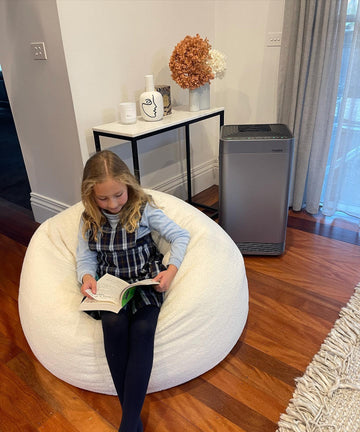In the quest for cleaner and healthier indoor air, many homeowners often wonder whether investing in an air purifier is necessary if they already have an air conditioning (AC) system in place. With concerns about indoor air quality on the rise, it's essential to understand the roles that air purifiers and AC systems play in maintaining a comfortable and healthy indoor environment. This article delves into the relationship between air purifiers and air conditioning, exploring the benefits of each and whether a portable home air purifier is a worthwhile addition to your indoor environment.
The Role of Air Conditioning:
Air conditioning systems are designed primarily to regulate temperature and humidity levels indoors, providing comfort during hot summer months and helping to prevent the growth of mold and mildew. While AC systems can filter out some airborne particles and allergens as air passes through the system's filter, their primary function is not air purification. Standard AC filters are generally not as effective at capturing smaller particles such as dust, pollen, pet dander, and volatile organic compounds (VOCs), which can affect indoor air quality and contribute to respiratory issues and allergies.
Understanding Air Purifiers:
On the other hand, air purifiers are specifically designed to remove airborne contaminants and improve indoor air quality. These devices work by drawing in air and passing it through a series of filters that capture particles and pollutants. High-efficiency particulate air (HEPA) filters, commonly found in air purifiers, are capable of trapping particles as small as 0.3 microns with a high degree of efficiency, making them highly effective at removing allergens, dust, smoke, and other pollutants from the air.
Benefits of Combining Air Purifiers and Air Conditioning:
While air conditioning systems and air purifiers serve different purposes, they can complement each other effectively to create a healthier indoor environment. Here are some key benefits of using both systems together:
-
Comprehensive Air Filtration: By combining an air purifier with your AC system, you can achieve comprehensive air filtration, capturing a wider range of airborne contaminants and improving overall indoor air quality. While AC filters may capture larger particles, air purifiers equipped with HEPA filters can effectively remove smaller particles that may escape the AC filter, providing more thorough purification.
-
Allergy and Asthma Relief: For individuals with allergies or asthma, the combination of air purifiers and AC systems can offer significant relief by reducing the presence of allergens and irritants in the air. Air purifiers can capture common triggers such as pollen, dust mites, pet dander, and mold spores, while AC systems help maintain comfortable humidity levels and prevent the growth of mold and mildew.
-
Odor Removal: Air purifiers equipped with activated carbon filters are effective at removing odors and volatile organic compounds (VOCs) from the air, addressing common indoor air quality issues such as cooking odors, pet odors, and household chemicals. While AC systems may help circulate air and reduce odors to some extent, air purifiers provide targeted odor removal for a fresher indoor environment.
-
Enhanced Health and Well-being: Cleaner indoor air can have a positive impact on overall health and well-being, reducing the risk of respiratory problems, allergies, and other health issues associated with poor indoor air quality. By investing in both an air purifier and an AC system, you can create a healthier and more comfortable living environment for you and your family.
Considerations When Choosing an Air Purifier:
When selecting a portable home air purifier to complement your AC system, there are several factors to consider:
-
Filter Efficiency: Look for air purifiers with HEPA filters or equivalent filtration technology to ensure high-efficiency particle capture.
-
Room Size Coverage: Determine the size of the area you wish to purify and choose an air purifier with adequate room coverage to effectively filter the air in that space.
-
Additional Features: Consider additional features such as air quality sensors, multiple fan speeds, and programmable timers for added convenience and customization.
-
Noise Level: Pay attention to the noise level produced by the air purifier, especially if you plan to use it in bedrooms or other quiet areas of the home.
Conclusion: While air conditioning systems play a crucial role in maintaining indoor comfort, they are not designed to provide comprehensive air purification. Investing in a portable home air purifier can complement your AC system by removing airborne contaminants, allergens, and odors, thereby improving indoor air quality and enhancing overall health and well-being. By understanding the unique benefits of both systems and how they work together, you can create a cleaner, healthier indoor environment for you and your family.
Ready to experience cleaner air? Join countless satisfied users and choose Nuwave air purifiers today. Discover why they're a favorite among those who prioritize clean, healthy living.


